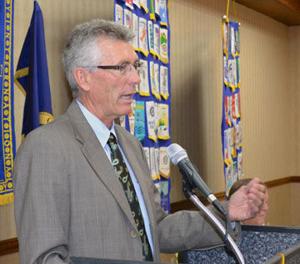Posted: Sunday, September 7, 2014
POCATELLO —
During his eight years on the Idaho Fish and Game Commission Randy Budge
has done everything from wrestle with pelicans to dodge complaints
about wolves from heavily armed sportsmen in North Idaho.
Budge, a native
of Soda Springs and a Pocatello attorney, served on the commission from
2006 until this June. State law only allows for Fish and Game
commissioners to serve for two four-year terms.
“I’m the beneficiary of term limits,” Budge told members of the Pocatello Rotary during Thursday’s noon luncheon meeting.
Although Budge said he learned a lot about the biology and science of
fish and game management in the Gem State, he also learned a lot about
sociology. He referred to some of the more colorful public hearings he
attended as “cheap entertainment.”
Budge said the wolf debate in Idaho sparked the most interesting
exchanges. After being introduced in the Greater Yellowstone Area in
1995, Idaho’s wolf population grew to about 1,500 animals quickly,
according to Budge. This led to the delisting of wolves as endangered in
2010 when Idaho established a hunting season for wolves.
“Wolves have been the dominant issue,” Budge said. “I can’t figure out
why some people demonize wolves and other people idolize them.”
The reintroduction of wolves to the ecosystem in North Idaho became a
hot issue when the one of the state’s largest elk herds went from about
15,000 animals to about 1,500.
Budge said the Fish and Game commission was forced to device an
“escape plan” after holding a hearing in Wallace after the elk herds
started to dwindle. He said there were vocal forces on both sides of the
issue present in the crowd of about 300 people. He also said the
meeting was located next to a bar, which was probably not a good thing.
And last year when a group in Salmon organized a wolf and coyote derby
with prizes for killing the most animals, Budge said the commissioners
were inundated with hateful emails from pro-wolf people. Budge said he
responded to the concerns by betting that not one wolf would be killed
and he was right.
According to statistics shared by Budge at the Rotary meeting, Idaho
has sold 43,000 wolf tags since seasons were established and hunters
have only killed 400 wolves.
That’s a low success rate compared to either deer or elk hunting. He
said last year Idaho hunters killed about 50,000 deer for a 30 percent
success rate and elk hunters had a 20 percent success rate with about
20,000 elk harvested.
“We don’t have a large wolf problem,” Budge said.
He explained that five areas in North Idaho have seen wolf depredation
severely affect the elk population, but that is not the case in the
other 25 areas of the state.
An avid fisherman, Budge said one of his main focuses on the
commission was to do something about the exploding pelican population at
Blackfoot Reservoir. He said the state is invested in bringing back
larger numbers of Yellowstone cutthroat trout, but the thousands of
pelicans along the Blackfoot River and reservoir have devastated the
trout numbers.
Because pelicans are protected under federal migrant bird legislation,
simply killing the birds wasn’t an option. Idaho Fish and Game finally
received permission to oil pelican eggs on two main island in the
reservoir to keep them from hatching.
Budge said management of the state’s fisheries has been a big success
and fisherman alone contributed about $550 million to the state’s
economy last year.
Budge said Idaho has the lowest cost for a resident fishing license of
the 11 surrounding states and the second lowest cost resident hunting
license making the sports very affordable for Idahoans.
He said Idaho Fish and Game faces to major challenges in the future.
The first challenge is that the agency is trying to manage all of the
state’s wildlife, game and non-game, but its funding is strictly through
the sales of hunting and fishing licenses. No general fund money is
given to prop up the agency’s $82 million annual budget.
Another challenge facing the department is the fact less young people
are becoming fishermen and hunters. This means license revenue will fall
in the future and bring the need for budget cuts to Fish and Game,
according to Budge.
Budge said of all the youngsters who complete hunter safety courses only 10 percent get a hunting license the next year.
He said the younger generation doesn’t seem to have the same
fascination with the great outdoors that he did as a kid and shared a
story about visiting the Lewiston Fish and Game headquarters.
Lewiston houses a massive taxidermy collection of every wild animal
and fish in the state. When Budge visited there were two young boys
sitting on the floor in the middle of the impressive display playing a
game on an iPod.
His efforts to call their attention to the mounted animals around them fell on deaf ears.


No comments:
Post a Comment